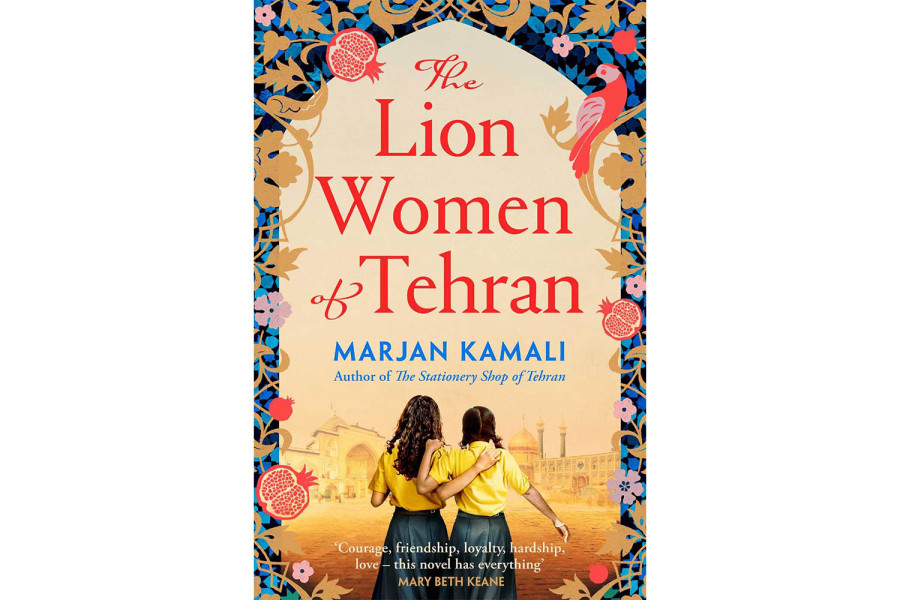Books
Friendship and feminism in changing Iran
‘The Lion Women of Tehran’ is a story of resilience and the fight for women’s rights in the country’s changing socio-political landscape.
Nisha Baruwal Chettri
‘The Lion Women of Tehran’ by Marjan Kamali is an immersive tale of friendship, courage, healing, empathy, acceptance, forgiveness, and redemption. Set over three decades in Tehran, Iran, Kamali—celebrated for her earlier work ‘The Stationery Shop of Tehran’—delves into themes of feminism, activism, and unwavering commitment to a cause and belief.
The story begins with thirty-eight-year-old Elaheh, affectionately called Ellie, who lives in the United States. One day, she receives a heartfelt letter from her childhood friend, Homa, who still lives in their homeland of Iran. Spanning the decades from the 1950s to the 1980s and into the present day, ‘The Lion Women of Tehran’ weaves together the lives of Ellie and Homa. Their bond, forged in the innocence of youth, ebbs and flows as life takes them on separate journeys. Yet, their paths intersect repeatedly, creating a rich tapestry of friendship, distance, and shared history.
In 1951, Ellie and Homa first met in Tehran under drastically changed circumstances for Ellie, who had moved to the slums with her mother after her father’s passing. Despite their different backgrounds, the two formed an enduring bond. Homa, who aspired to be a judge, contrasted sharply with Ellie’s simpler dream of marriage and motherhood. Yet, Homa’s bold vision inspired Ellie to think differently.
Homa’s fiery determination is beautifully captured in her words: “Lionesses. Us. Can’t you just see it, Ellie? Someday, you and me—we'll do great things. We'll live life for ourselves. And we will help others. We are cubs now, maybe. But we will grow to be lionesses. Strong women who will make things happen.” This vision planted the seeds of courage and ambition in Ellie, challenging her to imagine a life beyond the traditional path she had envisioned.
While Ellie’s mother was never happy with Homa’s presence in Ellie’s life, Homa’s family welcomed Ellie with open arms. It was in Homa’s home that Ellie learned to cook, while her mother never allowed her near a stove. Ellie was sometimes envious of her friend Homa. She wanted what her friend had, but most importantly, she wanted a loving father that her friend had. Their happiness, however, was short-lived. Ellie and her mother returned to their previous life when they agreed to marry her uncle, Massoud—a common practice, especially since Massoud, her father’s unmarried brother, was seen as a suitable match for a widow.
As Ellie prepared to leave, she and Homa exchanged gifts, a heartfelt gesture to ensure they would always carry a piece of each other, no matter where life took them. This bittersweet farewell marked the beginning of a new chapter in their lives, yet their bond remained unbroken by distance.
Over time, Ellie’s memories of Homa began to fade. The emotional lump in her throat she once felt when returning to her uncle’s grand home had vanished. Ellie had become one of the most admired girls at her school, even harbouring a secret crush on a charming young man from a nearby prestigious school, whom she had glimpsed at a café. Her mother, pleased with Ellie’s newfound social circle, was relieved to see her being friends with peers from their social class.
On a random day, midway through the school year, a new student joined Ellie’s school—none other than Homa. It felt as though no time had passed; they rekindled their friendship effortlessly as if they were once again neighbours. Yet, beneath the surface, much had changed since their last meeting. Homa’s life had taken a different path. Her father, a staunch communist, had been arrested by the Shah’s regime. Rather than succumbing to fear, Homa emerged stronger—more outspoken, determined, and unwavering in her resolve to fight against the Shahs. She juggled two odd jobs to support her family, attended school, and still found time to participate in communist meetings. Before long, Homa integrated into Ellie’s social circle, forming close bonds with Ellie’s new friends, Sousan and Nilo. Together, their lives intertwined again, with Homa’s fiery spirit leaving a lasting impression on everyone around her.
Life took a different turn for both of them after an incident at Sousan’s home, which she shared with her husband, the Colonel. The event forced the two friends to part ways, vowing never to see each other again. Homa’s decision stemmed from her desire to protect Ellie, while the latter, wracked with guilt, blamed herself for the hardships Homa endured and believed distancing herself would bring Homa peace. Soon, Ellie moved out of the country to help her husband, Mehrdad, pursue his dream of living in the States. Despite their separation, fate brought Ellie and Homa together again in the States, this time through Bahar, Homa’s daughter, who was profoundly affected by the war in Iran.
The themes in Kamali’s books are relatable, timely and significant. The author’s depiction of the shifting socio-political climate in Iran during and after the Iranian revolution, with a focus on women’s rights, prompts deep reflection. It makes us consider how many of us benefit from freedoms others do not have—freedoms we often overlook—while recognising the ongoing struggles women worldwide have faced and continue to face in their pursuit of these rights.
In conclusion, ‘The Lion Women of Tehran’ is a captivating journey that intertwines courage, friendship, loyalty, hardship, and love, brought to life through unforgettable characters and thought-provoking moments. Whether you’re a fan of historical non-fiction or simply seeking a book that lingers in your thoughts long after the final page, this is a must-read.
Chettri is a computer science graduate.
___
The Lion Women of Tehran
Author: Marjan Kamali
Year: 2024
Publisher: Gallery Books
Pages: 321




 15.12°C Kathmandu
15.12°C Kathmandu














